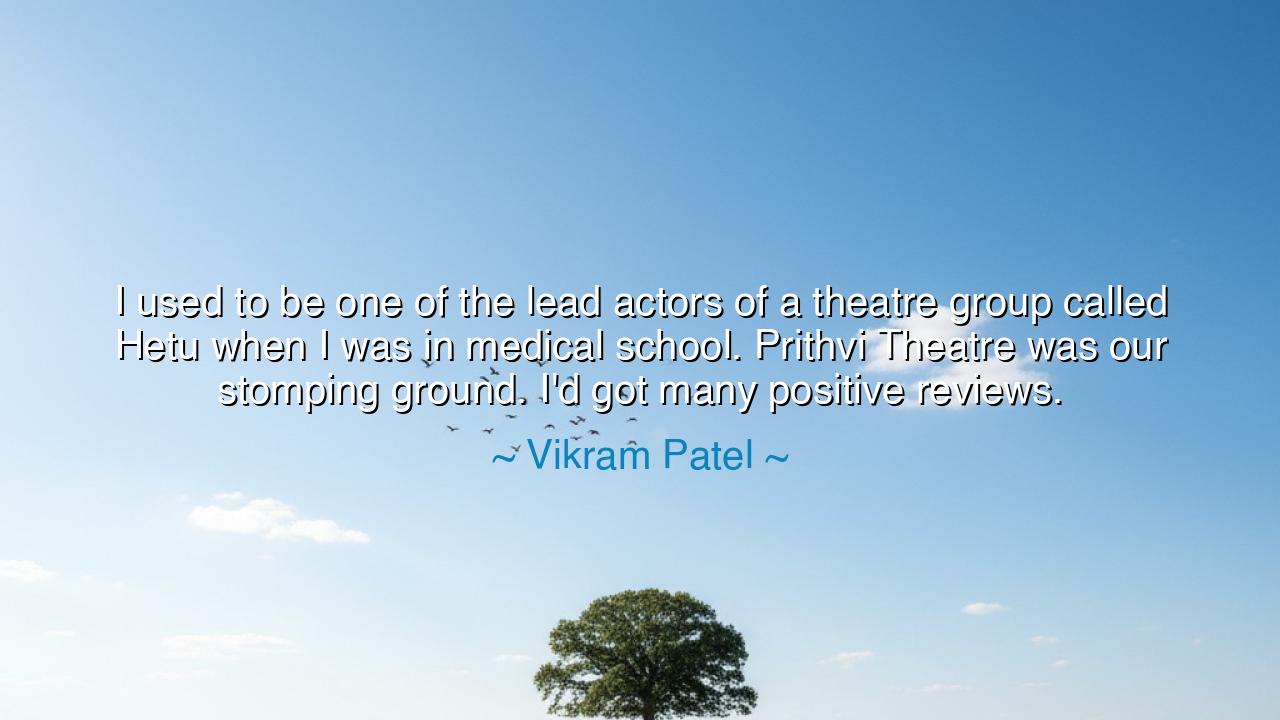
I used to be one of the lead actors of a theatre group called
I used to be one of the lead actors of a theatre group called Hetu when I was in medical school. Prithvi Theatre was our stomping ground. I'd got many positive reviews.






Hear the words of Vikram Patel, healer and thinker, who remembers the days of his youth: “I used to be one of the lead actors of a theatre group called Hetu when I was in medical school. Prithvi Theatre was our stomping ground. I'd got many positive reviews.” At first glance, these words speak of a pastime, of art and stage, of applause and reviews. Yet beneath them lies a deeper wisdom: that the human soul is not bound to one calling alone. Even a student of medical science—immersed in study of flesh, bone, and suffering—found life and freedom in the world of theatre, where emotions are bared and human truths are performed.
The origin of this reflection lies in Patel’s dual identity: both student of medicine and servant of the stage. He walked the halls of medical school, where discipline and rigor dominate, and yet he also walked the boards of Prithvi Theatre, where imagination and emotion reign. These were not contradictions but complements. For the stage taught him empathy, the ability to step into the mind and heart of another; and medicine required precisely this gift, for without empathy, science is sterile. His time in theatre was not diversion, but preparation—an unexpected training ground for the physician of the soul.
The ancients themselves wove together art and healing. In Greece, the theatre was not mere entertainment but sacred ritual, a place where citizens confronted sorrow, fear, and hope together. The tragedies of Sophocles and Euripides were themselves a form of medicine for the spirit, offering catharsis to those who watched. Likewise, healers were often musicians, poets, or philosophers, believing that the body could not be cured without the soul. Patel’s memory of acting in Hetu stands within this tradition: the healer who was also artist, who knew that to understand humanity one must first live within its many masks.
Consider the life of Anton Chekhov, the Russian doctor who became one of the world’s greatest playwrights. He tended the sick by day and wrote dramas by night, each vocation feeding the other. His plays gave voice to the hidden struggles of ordinary lives, and his medical work gave him insight into suffering. Like Patel, Chekhov shows us that the healer who also creates art is doubly armed—with science to mend the body and with story to mend the spirit.
The meaning of Patel’s words, then, is not nostalgia but testimony. He reminds us that positive reviews and moments on stage are not wasted youth but part of a deeper calling. The skills honed in theatre—presence, empathy, communication—became tools of his medical journey. His life stands as proof that no passion, however unrelated it may seem, is ever in vain. The soul is vast enough to hold many paths, and often it is the unexpected one that enriches the greater calling.
The lesson for us is clear: embrace the fullness of your gifts. Do not silence your love for art, music, writing, or performance simply because you walk another road. These pursuits are not distractions but teachers, shaping you into a more complete human being. For the scientist who acts, the doctor who writes, the soldier who paints, all bring depth to their primary path. To deny these parts of oneself is to walk half-blind; to embrace them is to walk in wholeness.
Practical action flows from this teaching. If you are in a demanding field, make space for your other passions. Let art, theatre, music, or story sharpen your ability to feel and connect. Do not dismiss your creative pursuits as trivial—they may one day become the bridge by which you understand others more deeply. And if you are a leader or teacher, encourage those you guide to seek balance, reminding them that wisdom is not found in one discipline alone, but in the harmony of many.
Thus Patel’s words endure as a beacon: a physician recalling his time upon the stage, not as a distraction but as a vital chapter of his journey. He shows us that medicine and theatre, science and art, rigor and imagination, need not be rivals but allies. Let us, then, carry forward this truth: that to heal, one must know both the body and the soul, and to know the soul, one must live through the many roles of humanity. For in this union lies the fullness of wisdom and the richness of life.






AAdministratorAdministrator
Welcome, honored guests. Please leave a comment, we will respond soon